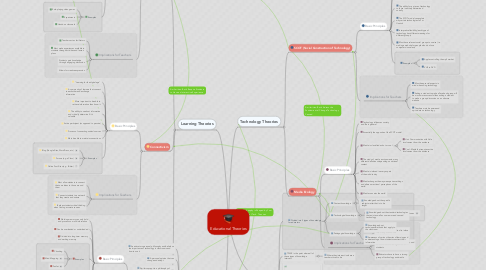
1. Learning Theories
1.1. Constructivist
1.1.1. Basic Principles
1.1.1.1. "The mind is a rhizome"
1.1.1.2. To learn you must build connections with the environment acting on you
1.1.1.3. Large problem originally introduced, then you break it down into small pieces
1.1.1.4. You gain knowledge through experience
1.1.1.5. Everyone is a different learner and student because of different life experiences
1.1.1.6. Discovery and collaborative based learning
1.1.1.7. Act within the "zone of proximal development"
1.1.1.8. Students as active learners, discovery learning
1.1.1.9. Examples
1.1.1.9.1. Role-playing video games
1.1.1.9.2. Experiments
1.1.1.9.3. Hands-on classwork
1.1.2. Implications for Teachers
1.1.2.1. Teachers act as facilitators
1.1.2.2. Must make experiences available to students through activities and lesson plans
1.1.2.3. Students gain knowledge through engaging discussion
1.1.2.4. Allows for creative expression
1.2. Connectivism
1.2.1. Basic Principles
1.2.1.1. "Learning for the digital age"
1.2.1.2. A community of learners that connect to eachother and exchange information
1.2.1.3. More important to be able to retrieve information than know it
1.2.1.4. The ability to seek out information and critically determine if it's valuable
1.2.1.5. Active participant (as opposed to passive)
1.2.1.6. Process of connecting nodes/sources
1.2.1.7. Must be able to maintain connections
1.2.1.8. Examples
1.2.1.8.1. Blog (Google Sites, WordPress, etc.)
1.2.1.8.2. Forums (e.g. eClass)
1.2.1.8.3. Online Post Sites (e.g. Twitter)
1.2.2. Implications for Teachers
1.2.2.1. Must allow students to connect their own ideas to those around them
1.2.2.2. Connect students to a network that they create and nurture
1.2.2.3. Teaches students critical thinking when finding accurate sources
1.3. Cognitive Load Theory
1.3.1. Basic Principles
1.3.1.1. Working memory can only hold and process so much information
1.3.1.2. Can be overloaded or underloaded
1.3.1.3. Divided into long-term memory and working memory
1.3.1.4. Examples
1.3.1.4.1. Chunking
1.3.1.4.2. Mind Mapping
1.3.1.4.3. Padlet
1.3.1.5. "The mind is a computer"
1.3.1.6. Environmental Stimulus -> Brain -> Learning
1.3.1.7. The way instructional materials are presented has a direct impact on achievement
1.3.2. Implications for Teachers
1.3.2.1. Educators must keep working memory in mind when creating lesson plans so that their students can successfully learn
1.3.2.2. Cannot overload their working memory but must also be careful to not under-stimulate it
1.3.2.3. Must be aware of how much material is being introduced otherwise students may have a fundamental attribution error
2. Philosophy of Teachnology
2.1. An educators personal philosophy and beliefs on the importance of technology in classrooms and how to use it
2.2. A personal opinion that can change and adapt
2.3. Similar concept to a philosophy of teaching only it encompasses technological tools
2.4. Typically a written statement but can also be a set of personal ideas
2.5. Examples
2.5.1. PLN
2.5.2. ePortfolios
2.5.3. Smart Boards
2.6. Brings up discussion topics and questions of technology as an educational tool
2.7. Allows educators to set goals for personal growth and maintain high personal expectations
3. Technology Theories
3.1. SCOT (Social Construction of Technology)
3.1.1. Basic Principles
3.1.1.1. Technology doesn't influence human action, human action influences technology
3.1.1.2. To use specific technology, you must first understand the social context of it
3.1.1.3. The ability for a piece of technology to thrive is entirely determined socially
3.1.1.4. The SCOT model can explain why certain technologies fail or flourish
3.1.1.5. Interpretive flexibility (each type of technology has different meanings for different groups)
3.1.1.6. Must have relevant social groups to survive (i.e. making a website for people who don't use computers is useless)
3.1.1.7. Examples
3.1.1.7.1. Apple controlling the mp3 market
3.1.1.7.2. VHS to DVD
3.1.2. Implications for Teachers
3.1.2.1. Must keep social aspects in mind when using technology
3.1.2.2. Asking a student to make a Facebook group will be much more successful than asking a student to make a group discussion on an obscure website
3.1.2.3. Teachers must be aware and up-to-date on technology
3.2. Media Ecology
3.2.1. Basic Principles
3.2.1.1. Technology influences society and life in general
3.2.1.2. Essentially the opposite of the SCOT model
3.2.1.3. Media is classified as hot or cool
3.2.1.3.1. Hot- Communication with little involvement from the audience
3.2.1.3.2. Cool- Media that requires active involvement from the audience
3.2.1.4. The study of media environments, many different definitions depending on national context
3.2.1.5. Media is infused in every aspect of the world today
3.2.1.6. Media changes the way we experience things and alters our actions/ perceptions of the world
3.2.1.7. Media connects the world
3.2.1.8. "The medium is the message"
3.2.1.9. Example
3.2.1.9.1. Star Trek predicted cell phones
3.2.2. Implications for Teachers
3.2.2.1. Media is a powerful tool to infuse into class, it cannot be overlooked
3.2.2.2. Must understand the technology around us to understand the dynamics of students
3.2.2.3. Educators have to have a strong grasp of technology and media
4. TPACK
4.1. Divided into 3 types of knowledge for educators
4.1.1. Content knowledge
4.1.1.1. Knowledge about the specific subject matter that is to be taught
4.1.2. Technological knowledge
4.1.2.1. Knowledge about the standard technologies that exist as well as some more advanced technology
4.1.3. Pedagogical knowledge
4.1.3.1. Knowledge about techniques/methods that apply to the classroom
4.1.3.2. Awareness of various theories of learning and understanding of how students construct their information
4.2. TPACK is the point where all of these types of knowledge intersect
4.2.1. Where they intersect is where a teacher strives to be
4.3. TPACK Venn Diagram
4.4. TPACK is not acquired, it is something to work on throughout your career
4.5. Also includes: TPK, PCK, and TCK
4.5.1. Technological pedagogical knowledge is being able to help students understand a technological tool and teach it effectively
4.5.2. Technological content knowledge is using technology successfully that is content specific and pertains to a specific course
4.5.3. Pedagogical content knowledge is the ability to convey information to students in a way that supports the pedagogy
